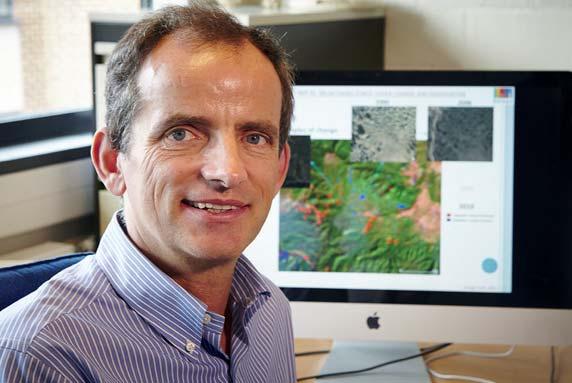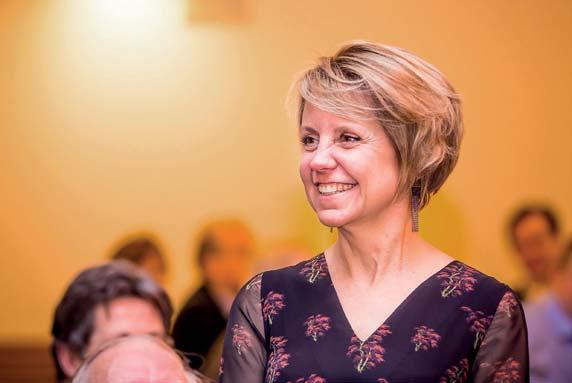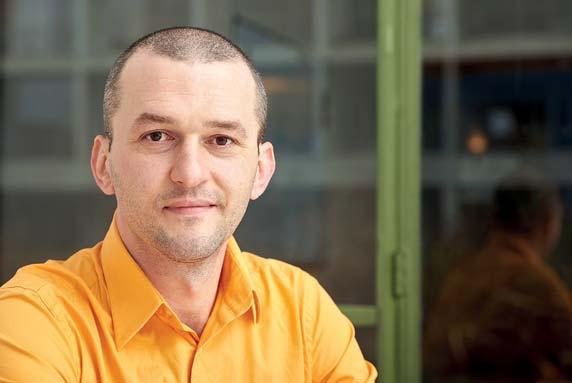
6 minute read
163
by 5rXobdlLrFp
An interview with Prof. Vincent BLONDEL, Rector of UCLouvain
Advertisement
What are the key figures for research at the UCLouvain? UCLouvain is a major force in research. More than 3,000 researchers, including more than 2,000 PhD students (almost 50% international), are active in all disciplines of Health Sciences, Science and Technology, and Human Sciences. Our university awards 300 PhD degrees every year, which represents more than a third of the theses defended in the Wallonia-Brussels Federation (WBF). In 2019, the research budget amounted to €251.7 million while 30% of the university's overall budget is funded by external credits obtained by our researchers. With its 21 research institutes, 38 technology platforms, 43 ERC Grants and 21 Francqui Prizes, UCLouvain is the WBF’s leading university for participation in European programmes and this share is increasing every year. It is ranked 128 th best university in the world by the Times Higher Education World University Rankings (2 nd Belgian university behind KU Leuven) and 167 th in the world in the QS ranking.
Could you tell us about the research highlights at UCL in 2019? I am delighted that UCLouvain has welcomed four new FNRSqualified researchers in 2019: Cyril Corbet (Institute for Experimental and Clinical Research), who has already received the Prix Galien for pharmacology and whose work aims to understand the behaviour of tumour cells; Bertane Visser, a researcher at the Earth and Life Institute, whose work focuses on the synthesis of lipids in certain wasps during evolution; Corentin Claeys Bouuaert, from the Louvain Institute of Biomolecular Science and Technology, who is studying the biochemistry of DNA during sexual reproduction, and Anne Reverseau (Institute of Civilization, Arts and Letters) who is studying the close relationship that many writers have had with images since the end of the 19 th century.
In addition, four of our researchers were awarded ERC Grants this year: Ana Beloqui Garcia, FNRS qualified researcher, is conducting research on oral drug delivery (NanoGut - Exploiting
© Eric Herschaft © Christophe Delarsille
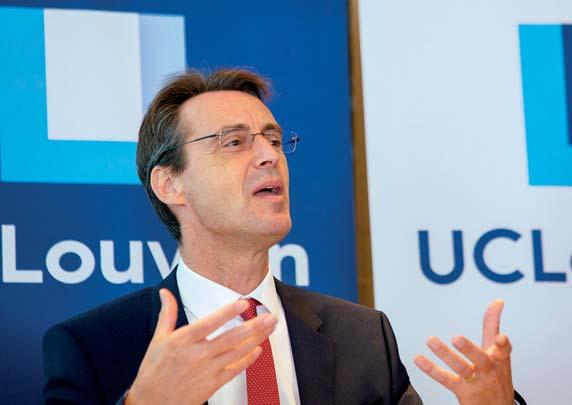
the pathophysiology of the gut towards innovative oral peptide delivery strategies) and Anthony Papavasiliou (ENGIE Chair) is studying the management and optimisation of energy markets (ICEBERG - Scalable Optimization of Power Systems with Flexible Demand and Renewable Supply). They both received an ERC Starting Grant. Véronique Dehant (UCLouvain and Royal Observatory of Belgium) received an ERC Synergy Grant with two French researchers for the GRACEFUL project which studies the processes at work in the liquid core of the Earth. Raphaël Jungers obtained an ERC Consolidator Grant for his research on the control of dynamic systems. In total, UCLouvain holds 43 ERC Grants.
Several 'concerted research actions' (CRAs) received funding in 2019: in social sciences, the MOOCresearch2.0 (A mixedmethod and multidisciplinary approach to sociocognitive conflicts in on-line educational platforms); the BParent (Parental burnout and its consequences on children: Towards an integrated and multilevel approach); and the CORSEP (Competition, Operations and Regulation of Sharing Economy Platforms) projects. In health sciences, the CYTAID (Exploring the roles of cytokines to identify new therapeutic targets for systemic autoimmune diseases SLE and Ssc) and the LIPOCAN (The roles of diet-, microbiota- and adipocyte-derived lipids in cancer progression) projects. In science and technology, the GWAS (Gravitational Wave Science), SURFASCOPE (Surface Enhanced Spectroscopy by Second-Principles Calculations) and the Bio-blueprints (Unveiling Nature’s 3D bio-blueprints of complex biological tissues by deep learning-supported high-resolution contrast-enhanced microCT) projects.
UCLouvain also obtained H2020 funding for four energy projects: HYDRA (Hybrid power-energy electrodes for next generation lithium-ion batteries) run by Prof. Alexandru Vlad; NEXTAEC (Materials for next generation alkaline electrolyzer), Prof. Joris Proost; FEVER (Flexible Energy Production, Demand and Storagebased Virtual Power Plants for Electricity Markets and Resilient DSO Operation), Prof. Anthony Papavasiliou and FLEXnCONFU (FLExibilize combined cycle power plant through power-to-X solutions using non-CONventional Fuels) promoted by Prof. Hervé Jeanmart.
Other projects deal with the ecological and social transition. One example is SUNRISE, in which Prof. Gian-Marco Rignanese (Institute of Condensed Matter and Nanosciences), is participating. It is one of the six European Union coordination and support action programmes currently endowed with €1 million. It aims to find a sustainable alternative for fuel production. Gauthier Limpens (Ecole Polytechnique de Louvain) raises the question of the role of storage technologies in energy systems with a high level of renewable energy. Prof. Éric Lambin (Earth and Life Institute) was awarded the Blue Planet Prize 2019 by Their Imperial Prince and Princess Akishino. For her part, Prof. Isabelle Thomas received the 2019 Fellow Award from the Regional Science Association International (RSAI).
Finally, several UCLouvain researchers have been designated Highly Cited Researchers 2019 by the Web of Science Group: Amandine Everard, Fabienne Danhier, Nathalie Delzenne, Audrey Neyrinck, Véronique Préat, Patrice Cani (Louvain Drug Research Institute), Bas van Wesemal, Éric Lambin and Patrick Meyfroidt (Earth & Life Institute).
Could you tell us about the health research activities at UCLouvain? Health research activities open up new perspectives in many areas. In addition to Prof. Cyril Corbet mentioned above, Prof. Patrice Cani’s team conducted the first pilot study in humans to observe the impact of the Akkermansia bacterium: it appears that it significantly limits the increase in several risk factors for cardiovascular diseases. Prof. Anabelle Decottignies, for her part, has found a way to kill cancerous cells, particularly in children, without affecting healthy cells. Prof. Olivier Devuyst received the Award 2019 for Outstanding Basic Science Contributions to Nephrology from the European Society of Nephrology, Dialysis and Transplantation (ERA-EDTA). His work aims to improve the efficiency of dialysis through the study of genetic kidney disease. As for Prof. Sophie Lucas (Institut de Duve), she received the GSK prize from the Academy of Medicine for her work on the treatment of cancer through immunotherapy.
Could you give us some examples of spin-offs recently created thanks to research work at UCLouvain? The Louvain Technology Transfer Office (LTTO) manages the funding of research contracts, protection and intellectual property management and its commercialisation (through licenses and/ or spin-offs). More than 75 spin-offs have been created since 1986, currently generating more than 2,000 jobs. In 2018- 2019, UCLouvain obtained the support of the Brussels-Capital Region for one new spin-off mandate (Launch program): PaCTES (Electronic voting for participatory democracy) and one Proof of Concept funding: ROMbio (Robust Operations Management for Biotechs). Three new First Spin-Off (FSO) mandates were supported by the Walloon Region: HYFLUX (water electrolysis intensification for green hydrogen production), SALDI (active substances with long duration of action for inhalation to fight respiratory deseases) and BIOCSOL (Biocontrol of plant diseases and biostimulation by bacteria).
The VIVES Louvain Technology Fund II, which has existed for more than 8 years, has contributed to the creation of 17 high-tech companies (more than 250 direct jobs) and attracted co-investors for more than €275 million. For example, Iteos Therapeutics SA, a spin-off of the Ludwig Institute for Cancer Research (LICR) and the Institut de Duve, has raised €64 million. As for A-Mansia Biotech, a spin-off created in 2016 (UCLouvain and Wageningen University & Research) and active in microbiome research, it has secured funding of more than €21 million.
Pr Nathalie Delzenne (Louvain Drug Research Institute), is one of the Highly Cited Researchers 2019 UCLouvain.
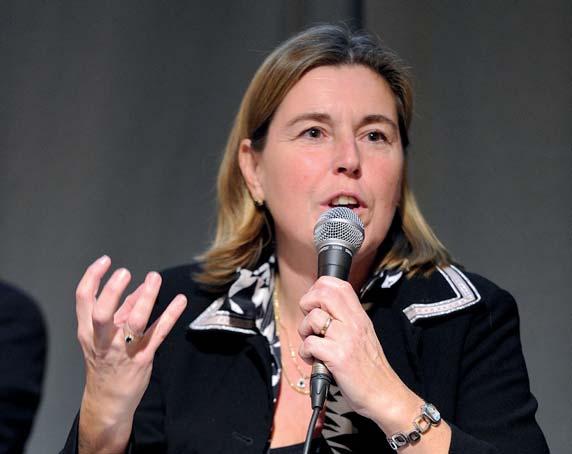
© Rights reserved Pr Éric Lambin (Earth & Life Institute) was awarded the 2019 Blue Planet Prize from the hands of Their Imperial Highnesses Prince and Princess Akishino (Japan).
